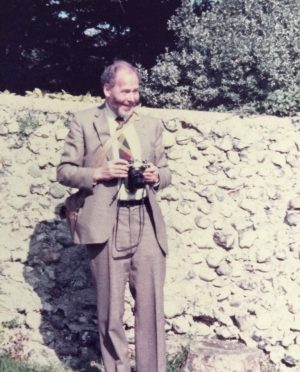
A Tribute: John Baxter Ruming, RIP.
Born in Surrey in April 1931, John lived for many decades in Carshalton, being a director of his residents’ society for 16 years, and moving to the Sussex coast only a couple of years before his death in August. In the 1970s he was a member of the Bishops’ Conference former Commission for International Justice and Peace (“CIJP”), which fostered diocesan J&P groups. He worked with a small Southwark group from about 1975-81, bringing people together to build a J&P community, collaborating with Paddy Purnell, SJ, to produce biblical reflections on the Sunday readings for all three liturgical years and seeing a part-time paid worker recruited. I first met him during the 1980s when he was Chair of the diocesan Management Team.
At that time he was also a leading member of CLC (the Christian Life Community movement), representing them on NCLA. He was He was an appreciated spiritual director and retreat leader, and National Chairman in 1986-88,, often speaking of the preferential option for the poor. The Spiritual Exercises of St Ignatius were at the heart of his life and all that he did, and CLC provided the root and support for him. He made very definite decisions about what work he was going to do, where to live, and so on. He was an enthusiastic walker, reflecting that we often read of Christ making journeys on foot.
He left office in CLC to become the first paid national J&P worker in 1988, interviewed by a panel chaired by a certain Mgr Vincent Nichols (General Secretary of the Bishops’ Conference), and including senior people from CAFOD and CIIR (later “Progressio”). On leaving, he wrote “I leave the Chair of CLC about the same time as I retire early and change direction in my own life, a very exciting time for me. I intend to become a student with a whole range of new inputs over the next year or so, to deepen my mission arising from our seventh General Principle, especially to work, as God wills, for the reform of the unjust structures of society.” His first act upon appointment in mid-1988 was to delay his starting date for 6-months to attend an Ignatian course of study and retreat at St Bueno’s in Flintshire, afterwards working through 1989, 1990 and 1991, returning for a few days to help at the 1992 conference in Lancaster.
The CIJP originally provided National J&P Conferences with secretarial services, while the commission in the diocese hosting the conference did the local organising. Upon John’s appointment, CIJP provided office space at Eccleston Square. John diligently recorded and filed everything, even more importantly taking initiatives in organizing events and maintaining contact with the network. He had worked with the electrical conglomerate, Philips, retiring early, and brought expertise on ‘new technology’, such the then cutting edge of home office equipment – a BBC-B computer. Providentially his successor had the same machine and daisy-wheel printer, ensuring a smooth changeover.
John was gentle with a smile for all, yet very determined and able to put forward his viewpoint fearlessly. Whilst being respectful, he was zealous and well able to confront those who disagreed, clergy included, usually maintaining equilibrium and ending upon good terms. A rosy complexion, a wicked sense of humour and twinkling eyes provided a passing resemblance to a garden gnome, perhaps helping his acceptance as a non-threatening innovation! He created the worker’s role, quietly winning over Bishops’ Conference staff and others. A familiar accessory was his old WW2 gas mask case, which he strung across his shoulder to carry materials and sandwiches.
When I became NLC Chair for the last of his three years with us he was unfailingly helpful and timely in knowing when to offer advice. His presence improved the handling of work in key areas such as supporting members, liaison with others and servicing regular meetings: the network became more productive and participation grew. He kept in touch with fieldworkers, getting their annual gatherings started. He visited at least 12 dioceses, meeting bishops and local concerned people to find out what support might be offered. He also established regular communication with a number of religious orders and church organisations. Consequently the scope of work expanded the Exec gained time to think strategically and work to develop the network and ensuring its visibility.
John was on Pax Christi ‘s Executive Committee for eight years from 1996, spending a year as Chair. In 1997 he was key to the logistical planning of their International Council in London, again demonstrating tremendous gifts for clear thinking and organisation. Pax Christi also benefited from his skills as a spiritual director.
He was good servant of the church with great commitment to the J&P mission, missed and remembered with admiration and thanks for his qualities, and with love. A truly lovely and dedicated person: may he rest in peace and continue to give us energy and hope from his new vantage point, face to face with the Lord.
Phil Kerton – with thanks to several others for their memories!



